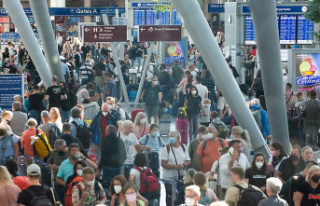There is currently no energy crisis, says Chancellor Scholz. The President of the Federal Network Agency sees it the same way, but he is still concerned. With Markus Lanz he explains what could happen to Germany - and what is now being done about it.
In the last few days, Chancellor Olaf Scholz has repeatedly amazed journalists in interviews. So on Tuesday afternoon at a press conference on the sidelines of the G7 summit in Upper Bavaria. The head of the capital's studio of "Deutsche Welle" came up with the security guarantees of the states for Ukraine and asked him if he could specify them. His answer: "Yes. I could. That's it." It remains to be seen whether the answer given to a foreign journalist was really appropriate. In any case, she was disrespectful.
Only a few hours later the next answer of this kind, Hanseatic short and meaningless. The ARD journalists asked the Chancellor if he could give a few savings tips in view of the looming energy crisis. His answer: "Nope." In addition, there is currently no crisis at all, he added after a few seconds of silence.
With Markus Lanz on ZDF on Wednesday evening, the President of the Federal Network Agency, Klaus Müller, classifies the Chancellor's statements. "If Scholz says we don't have an energy problem, he's right," he says. There is enough gas for June. The gas storage tanks would even continue to be filled, but not at the same speed as in the past few weeks. "That makes me a little worried," said Müller. However, the Bundestag is far ahead when it comes to legislation, and in the next week of meetings a "gas out coal in law" should even be passed. It regulates that coal-fired power plants will soon be started up again. In addition, the federal government has chartered four floating liquid gas terminals to create additional gas.
So everything ok? No, says Mueller. It is the task of the Federal Network Agency to assume the worst. This could include the fact that the gas pipeline Nord Stream 1 will no longer be started up after its alleged repair work by the Russian state-owned company Gazprom. "Then we get into very, very uncomfortable water, and you can't only encounter that in winter."
"As politicians, we are required to solve problems," says SPD leader Lars Klingbeil at Lanz. He has nothing to complain about in the Chancellor's communication. He made it clear that the citizens are not responsible for the current crisis. "What the Chancellor made clear is that we are not passing the problems on to the people."
The political scientist and Russia expert Liana Fix points out on ZDF that the population shares responsibility. She says: "We have to face the situation with a new mindset, namely that the energy crisis is a serious matter that politics may not be able to protect us from."
Klaus Müller also seems to see it that way when he appeals: "We have to save now." Tenants could now contact their landlords so that they can check whether the heating is set correctly. He goes on to say: "Every one of us is now in demand: industry, business, every private household."
Müller cannot yet say whether Germany is really going into a gas crisis. It is important to prepare for this, by the summer of 2024. "Until then, we will still be dependent on Russia," he says. In the meantime, however, Germany is being supported - by countries such as the USA, Norway and the Netherlands. LNG terminals could already cover up to ten percent of gas consumption this winter, and double that in 2023. Nevertheless, gas prices would continue to rise.
"Stern" editor-in-chief Gregor-Peter Schmitz fears not only the price increase, but the energy crisis in general. If gas has to be sanctioned, "then a whole new form of defensive struggle will come to Germany, and that is a social challenge." Just the fact that people are losing something has triggered incredible anger in other countries. "We're about to do the same," Schmitz is certain. The "Stern" editor-in-chief predicts that the discussion about solutions will have to go on for years if the conflict in Ukraine lasts a long time and Chancellor Scholz remains in power. "It's difficult, but that's political leadership."
And one might add: This requires more than monosyllabic answers.
(This article was first published on Thursday, June 30, 2022.)












